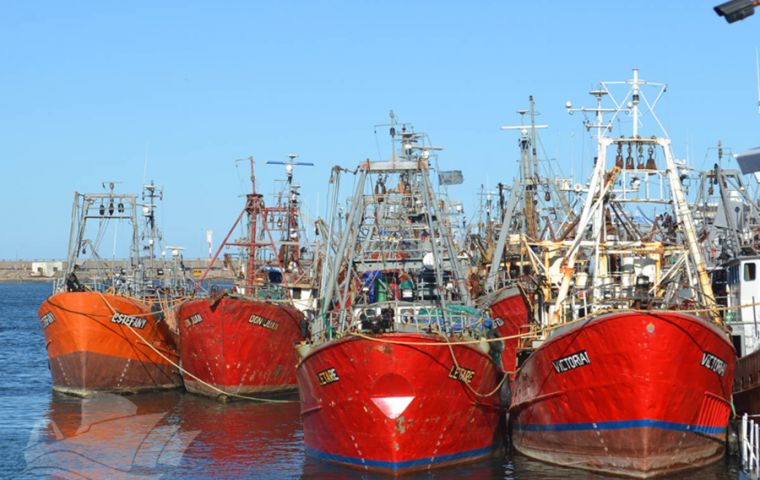MercoPress. South Atlantic News Agency
Mar del Plata fishermen go on two-day strike over wage bargaining
 Business owners are willing to negotiate, Frías admitted
Business owners are willing to negotiate, Frías admitted Fishermen of Mar del Plata's deep-sea Monday launched a 48-hour strike in demand of wage increases of up to 100% to cope with Argentina's inflation and after negotiations with the Business Chambers Caabpa and Caipa yielded no results.
As a consequence of the measure, Mar del Plata's fleet remained docked Monday and plans to do the same Tuesday barring last-minute developments.
The workers under the Argentine Association of Captains, Pilots and Fishing Skippers (Aacpypp) have undertaken a total strike in rejection of “the employer's delays in the negotiations to produce a wage increase,” the labor union reported Monday and “the delays of the business chambers Caabpa and Caipa.”
Hence, a two-day strike in the port of Mar del Plata was decided. The union also expressed its rejection toward the Chambers on the grounds that there are “two factors that affect the salary: the value of production, which is referenced with the official dollar, and those fixed tied to inflation, which must be adapted to the activity.”
Union leader Jorge Frías also pointed out that ”the fixed values tied to inflation must be adjusted to the activity, taking into account the inter-annual coefficient of the National Institute of Statistics and Censuses (Indec), which amounts to 83 %, and also the wage increases achieved by other transport unions.“
”Another factor affecting income is the value of production, which is referenced to the price of the official dollar,“ Frías added while admitting the current bargaining agreements have ”a substantial lag,“ although the chambers have shown their ”willingness to reach an agreement and expressed their own problems regarding inflation, operating costs and the exchange rate, among other issues.“
”But workers cannot, however, continue increasing the uncertainty that afflicts them daily in the face of inflation, which affects their family economy,“ the labor leader also stressed. Therefore, after talks which also featured federal Undersecretary of Fisheries and Aquaculture Carlos Liberman failed to achieve any results, it was ”necessary and appropriate to stop the fleet to defend the economy of captains and officers.“
”The 'imperfect, partial' system currently in use generates disagreements and wage inconsistencies between captains and officers according to the company, vessel, and function. The objective is to achieve a 100 % income increase,” Frías explained.




Top Comments
Disclaimer & comment rulesCommenting for this story is now closed.
If you have a Facebook account, become a fan and comment on our Facebook Page!